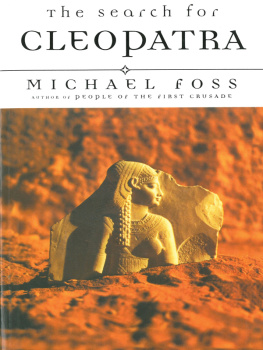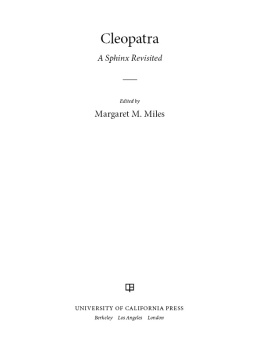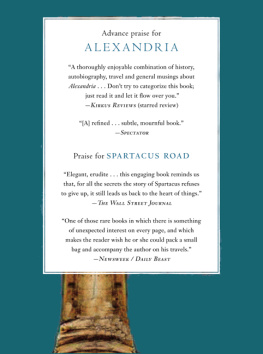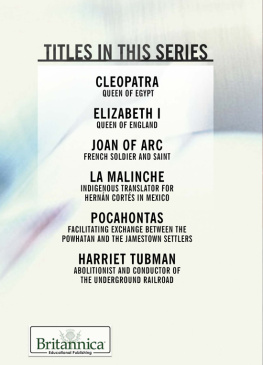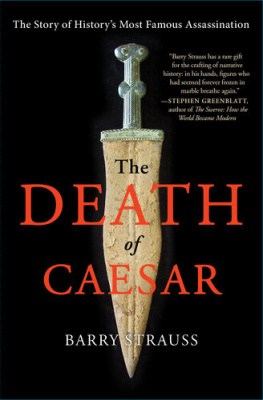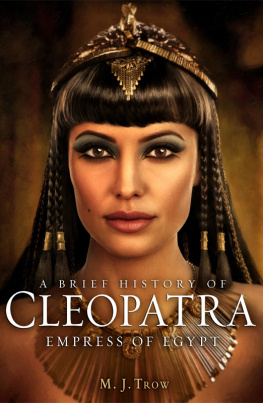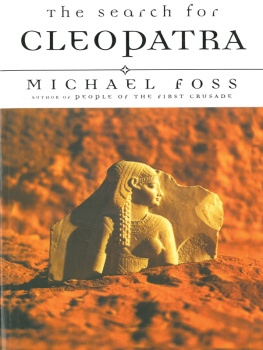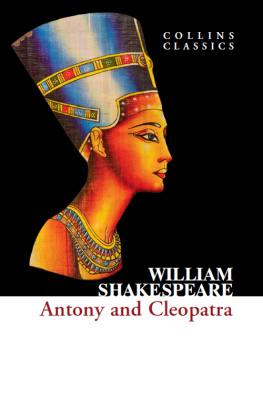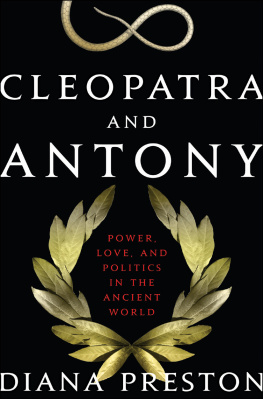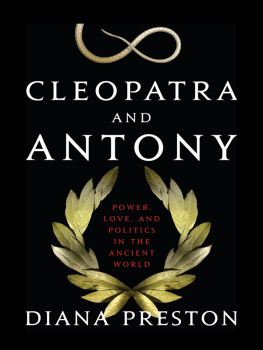THE SEARCH FOR
CLEOPATRA

Votive plaque of Cleopatra as an Egyptian goddess.
The publishers would like to give particular thanks to Laurence Rees and Ann Cattini of BBC Timewatch, and also Jonathan Lewis, without whom this book would not have been possible.
THE SEARCH FOR
CLEOPATRA
THE TRUE STORY OF HISTORYS
MOST INTRIGUING WOMAN
MICHAEL FOSS

Arcade Publishing New York
Copyright 1997, 2011 by Michael Foss
All Rights Reserved. No part of this book may be reproduced in any manner without the express written consent of the publisher, except in the case of brief excerpts in critical reviews or articles. All inquiries should be addressed to Arcade Publishing, 307 West 36th Street, 11th Floor, New York, NY 10018.
Arcade Publishing books may be purchased in bulk at special discounts for sales promotion, corporate gifs, fund-raising, or educational purposes. Special editions can also be created to specifications. For details, contact the Special Sales Department, Arcade Publishing, 307 West 36th Street, 11th Floor, New York, NY 10018 or info@skyhorsepublishing.com.
Arcade Publishing is a registered trademark of Skyhorse Publishing, Inc., a Delaware corporation.
Visit our website at www.arcadepub.com.
10 9 8 7 6 5 4 3 2 1
Library of Congress Cataloging-in-Publication Data is available on file.
ISBN: 978-1-61145-333-1
Printed in the United States of America
CONTENTS
BETWEEN PAGES 64 AND 65

BETWEEN PAGES 128 AND 129
Ptolemy I
Soter I
305282 BC

Ptolemy II
Philadelphus
284246 BC

Ptolemy III
Euergetes I
246222 BC

Ptolemy IV
Philopator
222205 BC

Ptolemy V
Epiphanes
204180 BC

Ptolemy VI
Philometor
180145 BC

Ptolemy VII
Neos Philopator
145 BC

Ptolemy VIII
Euergetes
II 145116 BC

Ptolemy IX
Soter II (Lathyrus)
115107 BC

Ptolemy X
Alexander I
10788 BC

Ptolemy IX
Soter II (restored)
8880 BC

Ptolemy XI
Alexander II
80 BC

Ptolemy XII
Neus Dionysus (Aulet
8051 BC

Cleopatra VII
Philopator
513O BC


L ABORIOUS COLLECTIONS OF FACTS, gathered with ingenuity and great effort and judged with difficulty, make up our written histories. Out of this slow accumulation we build our picture of the past. But it is the picture not so much the evidence that we need, for our imagination seems to be primarily visual And in our pictures what we most like perhaps what we must have is not some absolute of historical truth founded on a mountain of small certain facts. In any case, that is hardly possible, given the partial and much-erased record of history. Rather, we want a vision for the mind that reveals itself in drama, passion, elemental conflict, emblematic events that become the basis for mythologies.
Imagine a woman of sufficient interest to throw future ages into a labyrinth of dreams. Imagine her in all the variety and grace and appeal of mature womanhood taken to its utmost possibility, with the mind and a body to captivate a caesar, a world-conqueror, an emperor. Did such a person exist, or was she only a figment of the imagination?
History has suggested to us that there was such a woman, formed in the flesh and blood of an Egyptian queen of the first century BC. This woman Cleopatra VII of the house of Ptolemy has appeared to later generations to contain all the rare elements of a woman of dreams. She captivated not one caesar but two, and made another one the greatest of the three tremble so that one of his Romans wrote that Rome, the city of conquerors, had feared only two people: Hannibal and Cleopatra.

Alexander the Great arrived as the new conqueror of Egypt in 332 BC and so began the period when Egypt was ruled by the Ptolemies from Macedonia on the Greek mainland.
Who was this woman Cleopatra?
In June 323 BC, when Alexander the Great died suddenly in Babylon after a short but meteoric life of conquest, his Macedonian generals scrambled for the remains of his empire. The general Ptolemy, a tough and proven soldier who was also, in the manner of so many men of the mountains, shrewd, obstinate and wily, knew that he desired two things: the body of Alexander and the land of Egypt.
For a man of good judgement these two objects of desire went together; it was at the Egyptian oasis of Siwah that the oracle of Amon had saluted Alexander as the son of the god. Thus there began in Egypt the second and more remarkable career of Alexander the Great, which turned him from a successful conqueror an ordinary piece of mortality into a blazing star of mythology a cult-hero and a god whose image became the possession of the world. Even today we see the embers of his fiery trail laid across the mind of humanity. A modern historian, following in the footsteps of Alexander, writes:
We saw his story retold by Greek and Turkish shadow-players, and by Tadjik bards. We saw one of the last of the travelling one-man shows in Iran, complete with painted backdrop showing the death of the Persian king, Darius, in epic style. We heard about Greek medicine from the doctors of Multan in north-east Pakistan, who claim descent from Alexanders physicians; we sat in a felt yurt on the Turkmen steppe to hear the story of his devils horns and his two-week sex romp with an Amazon queen.
Ptolemy wanted Egypt, the richest of all Alexanders conquests, and he knew that the possession of Alexanders corpse would give him the venerated body of a vivid new god and a talisman of extraordinary power in the ancient land. After discussions in Babylon, Ptolemy became satrap of Egypt, though there was doubt whether Alexander should be entombed at Siwah or in the Macedonian homeland at Aegae. Ptolemy hurried to take up his territory. Then while Perdiccas, the foremost of Alexanders generals, was engaged elsewhere, Ptolemy waylaid the funeral procession and took the heros corpse to Memphis. Here, in the old capital of Lower Egypt, the body stayed until a fitting tomb the Sema was prepared in Alexanders own city of Alexandria. Within two years Perdiccas, who saw too late that he had been out-manoeuvred, attacked Egypt, but without success. In 321 BC he was stopped at the Nile. His invaders became the first of many enemies to the rule of the Ptolemies whose corpses were fed to the crocodiles of the river.
Next page
